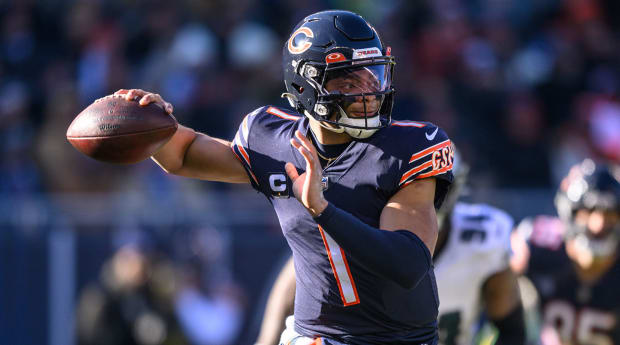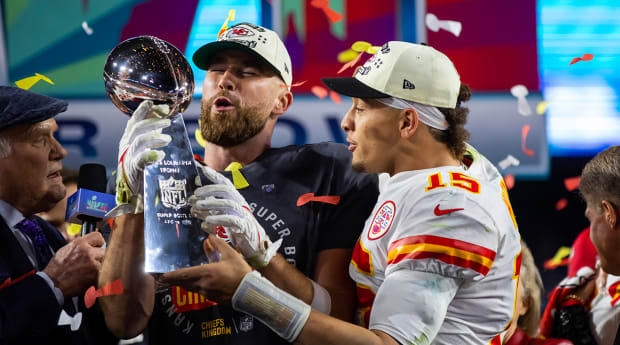We’re now closing on the start of real, actual football practices with full rosters—those get underway two weeks from Monday. For now …
• Bears offensive coordinator Luke Getsy said Monday that QB Justin Fields is “light-years ahead” of where he was a year ago, so I went looking for a little context on where Fields has taken those big steps. Tangibly, it should show up with the mental work he’s done to improve his command at the line of scrimmage—in changing protections and making adjustments within the offense. He’s made the comment to the coaches over the last couple of weeks that he could never have had the conversations with them last year that he’s having now, which is a great sign for where they are collectively.

Daniel Bartel/USA TODAY Sports
The caveat is that, up until now, he’s been limited physically in what he can do as he rehabs a couple of injuries from last year. But he’s getting to the point now where he can do just about everything he needs to and should be a go when full OTAs start for Chicago on May 22.
Also, what’ll be out there around Fields should help, too. First-rounder Darnell Wright shone at rookie minicamp over the weekend, and the Bears feel really good that the freakish tackle has answered some of the work ethic and drive questions that were asked about him predraft. One thing that helped Chicago was Getsy’s coaching Wright at the Senior Bowl—which allowed for both him and GM Ryan Poles to get an inside look at how the Tennessee product works through the week. They challenged him there, and he answered the bell, so the Bears took him with the 10th pick, and as a result now could have a solid long-term bookend tandem in him and promising second-year man Braxton Jones. Add to that the acquisition of DJ Moore, and Fields is in a much better spot, both individually and from a team standpoint, than he was last year.
• In the MMQB Takeaways on Monday we gave you a few draft follow-ups from NFL executives, and I saved one to dive into here, because I think it highlights a couple of interesting developments.
“The first thing that jumps to mind is what options will look like in four years,” says an NFC pro scouting director. “More than half of the 2020 [first-rounders] were not exercised—so what will it look like four years after we had such an uncertain draft this year?”
Which leads me to my first thought on this: that teams are more comfortable declining those fifth-year options than ever before. As this scouting director alluded to, just 12 out of 32 first-rounders from 2020 had fifth-year options picked up by last week’s deadline. That number is, well, really, really low. In fact, the previous low was 17. In five of nine years (before this year) that the system was in place, the number of options picked up topped 20.
I think there are a couple of reasons for the dip.
One is obvious, and that’s that the options are fully guaranteed now, whereas for the first seven years of this rookie-pay system (starting with the 2011 draft class, whose ’16 options were picked up in ’14), they were only guaranteed against injury. Another is less obvious: With the amount of turnover there’s been in the GM and coaching ranks, there are more and more teams that aren’t employing the guys who drafted the players in question.
Then, there’s my second thought, and that thought relates back to where we were in 2020, in the month or so leading up to the draft. The pandemic struck just after the combine, basically shutting down pro days and 30 visits for that year’s class, forcing everyone to learn what Zoom was on the fly—and try to replace important in-person elements of the process with some semblance of a video-conferenced facsimile.
I can remember teams saying then that they had far less information than they normally would heading into the draft, and that was borne out in a number of first-round picks that fell out of the league for off-field reasons. Both Raiders first-rounders, Henry Ruggs III and Damon Arnette, were done within two years, and the Titans’ first-rounder, Isaiah Wilson, didn’t even get to a second NFL season. The information void was also illustrated in the sizable number of on-field first-round failures (Jeff Okudah, Mekhi Becton, Jalen Reagor, etc.).
That, of course, also highlights the importance of the predraft run-up for teams, in learning who these guys are as players and prospective pros.
So, yup, 2020 was really sideways. And if, three years from now, the ’23 class looks as bad as that one does now, then a lot of things a lot of us were saying about it the last couple of months will prove to be justified.
• Another exec’s biggest takeaway from draft weekend? “Detroit’s drafting of nonpremium positions.” And I’d agree that how the Lions used their first-rounders was surprising. That said, last week, we went over their rationale, and I can say other teams I talked to understood what Brad Holmes and Dan Campbell were doing.
Simply put, there just weren’t a lot of top-end players in the draft. Plenty of teams had fewer than 15 first-round grades in the entire class and were into their second-round grades by the end of the top 20. So if, say, you view Jahmyr Gibbs as a blue-chip weapon, or Jack Campbell as a blue-chip, off-ball linebacker, and you see the corner or edge rushers still available as good, but not great (or, in other worse, red-chip players), you can get yourself to the point where you might draft a certain position higher than you would in another year.
• We touched on the Chiefs’ tackle situation Monday morning in the MMQB Takeaways, and Andy Reid addressed it a few hours later—saying that Donovan Smith will, indeed, be the first-team left tackle to begin OTAs. And for what it’s worth, the Buccaneers believed Smith did have gas left in the tank when they cut him in March.
The larger question was how motivated Smith would be to keep going after battling through injuries last year. With the Bucs retooling, and Smith carrying a big number, it was fair to wonder that for Tampa Bay. Kansas City, on the other hand, should be competing for another title, and Smith went there on a deal that’s worth $3 million in base pay but has incentives that could take the pact to $9 million. So if it doesn’t happen there, it probably wasn’t happening anywhere.
• I forgot to put an interesting anecdote into The MMQB Lead on Monday morning on Aaron Rodgers, so this seemed like a good place to dump it.
After agent David Dunn told the Jets that Rodgers wanted to play in New York in the wee hours of March 13, word of the decision started to filter out to friends and teammates of the four-time NFL MVP. How much so? Well, once the tampering period opened, Allen Lazard’s agent called Jets GM Joe Douglas and said, basically, Hey, we’re hearing good things. We’re hearing that you’re gonna have a new quarterback soon. We want to come.
So that’s how Lazard became a Jet.
• Sorry if I can’t get riled up over whether teams contacted a retired Andrew Luck. I understand where the NFL might have to punish such an action, for precedent’s sake. But I don’t really see this particular case—with the Commanders having fished around on Luck as they researched every quarterback under the sun in 2022, as creating any sort of competitive imbalance.
Also, I’ll say Washington really has stuck to its word on being committed to Sam Howell as its starting quarterback this offseason.

Mark J. Rebilas/USA TODAY Sports
• The schedule’s coming—so who will the Chiefs open with on Sept. 7?
My guess is the NFL will save their Bills and Eagles games for later in the year. The Bengals might make some sense because they don’t have a big national following (meaning that saving it for ratings might be less of a factor, and it’d be a massive game to put in that slot). The Chargers would be fun, too, and some K.C. folks think that’s who it’ll be, but only one of the last 10 of these kickoff events was a division game, and that was Bears-Packers in 2019, scheduled there to commemorate the league’s 100th season.
If not the Chargers, Bengals, Bills or Eagles, there are still some fun possibilities. One would be the Lions, who were red hot at the end of last year and have a shot to be one of the league’s most entertaining teams. If the league doesn’t have the stomach to put Detroit on that stage (and I’m not sure it would), Miami would be another interesting idea, with Tyreek Hill’s homecoming a natural theme and the Dolphins coming off a playoff season (although the NFL might want to avoid the story line about Tua Tagovailoa’s concussion history that would come with that one).
• It was just rookie minicamp, but the feedback I’ve gotten back on Anthony Richardson’s first weekend on the field with the Colts was solid. He came in with energy, ready to work and excited to learn. Everyone knows he’s got a long way to go. But who the guy is as a person was a big reason Indianapolis was comfortable taking him where it did, at No. 4, and it’s the reason the team believes he’ll be able to take the steps he needs to.
• The 49ers, believe it or not, have the flexibility to wait to name a starting quarterback. So, yeah, there’s every reason for Kyle Shanahan to swing the doors open to a competition at the position while Brock Purdy rehabs (the Niners are still about a month out from getting a more concrete timeline on his recovery). Maybe Sam Darnold will prove himself to have been a victim of circumstance. Maybe Trey Lance will break through. Either way, it makes all the sense in the world for the Niners to pull both levers for now—and I expect they will.
• One thing on Jordan Love after we had a couple of pieces tied to him Monday—I don’t think it’s a small deal that he was able to gather the Packers’ promising young receivers, most prominently Christian Watson and Romeo Doubs, before the team’s offseason program. Green Bay quietly felt that Watson and Doubs may have come along faster last year had they gotten work with Rodgers in the spring, and I’d mostly agree with the idea of that.
The extra work does matter, as does the fact that Love’s teammates are putting it in during their own time off to get that work in with him.







